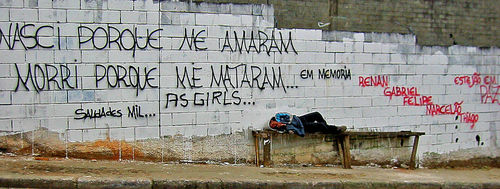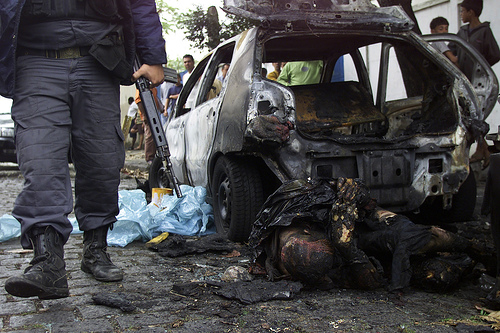
Graffiti reading:
BORN BECAUSE THEY LOVED ME
DIED BECAUSE THEY KILLED ME…
In Memory:
RENAN
GABRIEL
FELIPE
MARCELÃO
THIAGO
Rest In Peace
at Morro de Samba (Samba Hill), Rio de Janeiro, “Infamous for its heavy drug trafficking and violence, the Morro de Samba is renowned as one of the most dangerous communities in our region”, photo by carf used under a Creative Commons License
As the rest of the world, Brazilian bloggers are closely following the latest developments of the Israel-Palestinian conflict. Opinions are divided, but the conflict has, nevertheless, led bloggers to reflect upon one thing: some feel that what is happening in Gaza has a parallel with the daily wars in the violence plagued shantytowns around the country – dubbed Brazil's very own Gaza Strips – where many innocent lives are claimed every day. Sérgio Vaz [pt] explains:
Aqui no Brasil, na Baixa do Sapateiro, faixa de gaza baiana, menino Matheus morreu com um tiro de Fuzil quando saía de casa para comprar pão, no mesmo momento em que a polícia invadia sua favela.
Mera coincidência, ou são sempre os mesmos que sangram nas calçadas, quer seja na faixa de Gaza brasileira ou na Faixa de Gaza Palestina? Será que a sede de sangue nunca cessa?
A Periferia debaixo de tiros, a Palestina debaixo de bombas. Será que deus foi passar o réveillon em Copacabana?
Is it just coincidence, or is it always the same [innocent people] who die on the pavements, either in the Brazilian Gaza Strips or in the Palestinian Gaza? Will the thirst for blood ever end?
The suburbs are under fire, Palestine is being bombed. Has God gone to spend New Year's eve in Copacabana?
On seeing the shocking pictures of the conflict on the internet, Anderson Vieira [pt] could not help but remember the days he used to visit one of Rio de Janeiro's slums where, he says, it was normal to see strongly armed drug dealers walking side by side with kids, pregnant women and the elderly. Every now and then the police would make a disastrous appearance there:
Acontece que não foram poucas as vezes que em incursões da polícia em morros e favelas cariocas, na troca de tiros, no fogo cruzado, pessoas inocentes acabavam sendo atingidas pelas famosas balas perdidas, que de perdidas não têm absolutamente nada.
A situação da Faixa de Gaza é de certa forma parecida com a das favelas e morros cariocas. Ali em meio aos terroristas do Hamas há crianças, mulheres, homens, cidadãos palestinos inocentes e desprotegidos. À semelhança dos traficantes que se escondem em barracos e casas de moradores a fim de fugir da polícia, os terroristas do Hamas também se valem dessa estratégia no mínimo covarde e se infiltram em casas de inocentes.
The situation in the Gaza Strip is somehow similar to that of the slum and shantytown hills in Rio. There, among children, women, men, vulnerable and innocent Palestinian citizens are Hamas terrorists. Resembling the drug dealers who hide themselves in resident's sheds and homes to evade police, the Hamas terrorists also make use of this cowardly – to say the least – strategy, and infiltrate innocent people's homes.
Aparecido José do Rosário [pt] agrees and adds that in these cases, the end justifies the means:
Mas voltando a questão sobre o que Israel deve fazer contra esses ataques, e faço um paralelo com o problema dos morros no Rio de Janeiro. Desculpem-me mas sou um tanto radical nesse sentido. Tenho a minha opinião de que a polícia e/ou exército deve atacar os morros a todo custo. Aqueles que nada tem a ver com os traficantes, que são inocentes devem sair de lá e deixar que as forças militares façam o serviço completo, agora, aqueles que protegem tais traficantes, são cúmplices e tão criminosos quanto eles, e portanto que sofram as conseqüências. Estarei eu sendo insensível?
“27/07/2005 – Police find three bodies burned in Inhaúma. The victims may have been killed when coming into the shantytown to try to recover a vehicle stolen by drug dealers from Favela do Alemão.” Photo Andréa Farias, used under a Creative Commons License.
Sonia Fancine [pt], a young and rising politician from São Paulo, says that blaming Hamas for the death of civilians is exactly what the Brazilian police does when justifying casualties by saying they are protecting the population, and “if a child dies because of a stray bullet, it is just an undesirable side effect of a successful operation”:
As mortes “acidentais” freqüentemente são justificadas como decorrentes de “autos de resistência” (aquelas trocas de tiros que, curiosamente, só deixam marcas de um dos lados) ou como sendo de ” pessoas ligadas ao tráfico” (aí fica fácil – se mora na favela, é ligado ao tráfico, pronto). Então ficamos assim: as crianças palestinas e das favelas do Rio morreram porque tiveram a idéia de jerico de estar em um lugar cheio de terroristas/ traficantes. E ainda foram botar o corpo bem na frente dos mísseis/ fuzis… Foi mal aê. Mas da próxima vez, as vítimas que tomem mais cuidado, pô!
In a comment on the above post, a reader called Fernando [pt] feels powerless in the face of both conflicts:
E como acabar com tudo isso? Seja no Rio ou lá em Gaza é a mesma coisa: desrespeito ao comum – incompreensão do diferente! E como eu posso ajudar para acabar com tudo isso?
Alberto Ricardo Präss [pt] thinks that Brazil should help by boycotting Israeli products and remembers the situation he witnessed when he lived there for six months in 1985 concluding that Brazil is not far from it:
Não é de se espantar que homens bombas surjam sem parar naquelas bandas. É muito evidente que pessoas acuadas tendem a ter reações radicais para sobreviver. Mais ou menos como os moradores das favelas do Rio, que reagem por estar sem muita saída.
On the other hand, Mr X [pt], a supporter of Israel, believes the Israel-Palestine conflict does not deserve so much media attention or popular commotion compared with other conflicts in the world, including in Brazil:
Mata muito menos do que qualquer conflito na África hoje em dia, menos do que a cólera no Zimbabwe, menos até do que os tiroteios nas favelas do Rio de Janeiro.
Tania Celidonio [pt] says she is shocked by the daily news on the violence in the Middle East, but that violence in Rio de Janeiro has been turned into a cliche:
Motorista da ONU assassinado, trinta civis palestinos mortos num abrigo, fim da ajuda humanitária…. Juro que travei. E ainda por cima, aqui na faixa tupiniquim do Rio de Janeiro, os tiros não esperaram passar a primeira semana de 2009. Os morros da Babilônia e Chapéu Mangueira foram sacudidos por várias saraivadas. Nós, do asfalto, ficamos torcendo para que nada de muito ruim aconteça por lá. O pior são as centenas de trabalhadores que voltam para suas casas, no cair da noite, e são recebidos por esse ambiente de terror que já virou rotina nos morros da cidade.

“Old fellow, don't you think it is a bit late to be walking around Bonsucesso?” – Blog do Bonitão's charge sets the Israel-Palestine conflict in a Rio de Janeiro neighborhood which is surrounded by slums and ravaged by a high level of violence
In Pernambuco, the murder counter on the PEBodyCount [pt] blog which provides daily statistics of the rates of crime related deaths has counted, as of today, only 11 days into the new year, 81 homicides in that state alone The blog counted 4,525 homicides in 2008, in 2007 4,592 and in 2006 4,638. Numbers are decreasing, but:
“Raciocinar que 78 pessoas a menos (pelas contas do Governo, pelas nossas, foram 67) perderam a vida não quer dizer que foram salvos 78 seres humanos. Continuamos tendo mais de 4.500 assassinatos. É um patamar que coloca nosso estado entre os locais mais violentos do mundo. São poucos os países que tem tantos crimes de morte por ano. A mudança tão apregoada precisa começar de verdade.”








3 comments
Realmente, cara Paula, temos várias faixas de Gaza aqui no Brasil! Tem razão, assino embaixo deste protesto contra os terroristas do Hamas que se infiltram no meio do povo simples, que não merece morrer em vão…
Marcos, porque Hamas has to be always blamed? Voce sabia como and why Hamas came to exist? Voce sabia que os palestinos have been fighting a brutal occupation in Palestine done by the Jews com o support dos Estados Unidos por mais de 50 anos?
Eu acho que voce must educate yoursef about what is really going on between Israel and Palestine, and don’t reapet what the jornalists from Globo tell you on the news because there is a big whole to cover up when it comes to really review the truth in many media around the world, including Brazil.